
Herbal Smoking Wellness: All You Need to Know
Explore the benefits and tips of herbal smoking wellness with information on health impacts, botanical choices, and DIY blends.
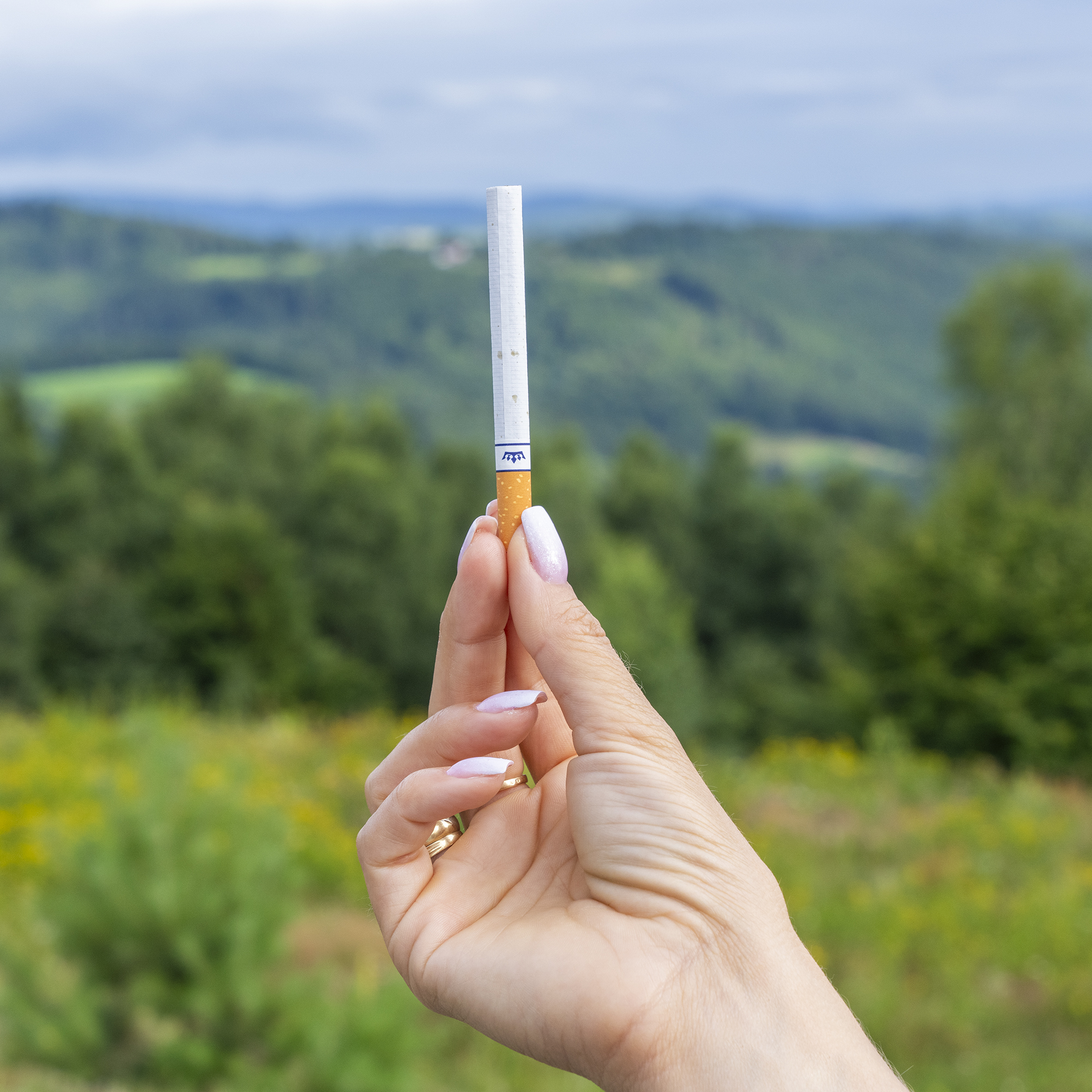
The choice between smoking KHOOR herbal vs. tobacco cigarettes carries significant implications for health, the environment, and legal aspects.
Here at KHOOR, we believe that understanding these differences can help you make more informed decisions about your smoking preferences.
Join us as we explore the health impacts, environmental considerations, and legal perspectives surrounding hemp and cigarettes.
When comparing the health impacts of smoking hemp vs tobacco cigarettes, it’s clear that the chemical compositions and their effects on your body are fundamentally different.
Traditional tobacco cigarettes contain over 7,000 chemicals, with at least 69 of these being known carcinogens such as formaldehyde, benzene, and arsenic. This toxic mix contributes to the dire health risks associated with cigarette smoking, like lung cancer and heart disease. In contrast, hemp cigarettes consist primarily of the phytocannabinoid CBD, and they lack the nicotine present in tobacco. CBD is generally considered well-tolerated with few serious side effects. However, hemp cigarettes are not entirely risk-free, as they emit carbonyl compounds, including formaldehyde and acetaldehyde, which can pose health risks.
In the short term, smoking any type of cigarette can lead to increased blood pressure, a higher heart rate, and diminished lung function. Over the long term, cigarette smokers are at risk for chronic conditions such as emphysema, chronic bronchitis, and numerous types of cancer. Studies show that tobacco is responsible for about 480,000 deaths annually in the United States.
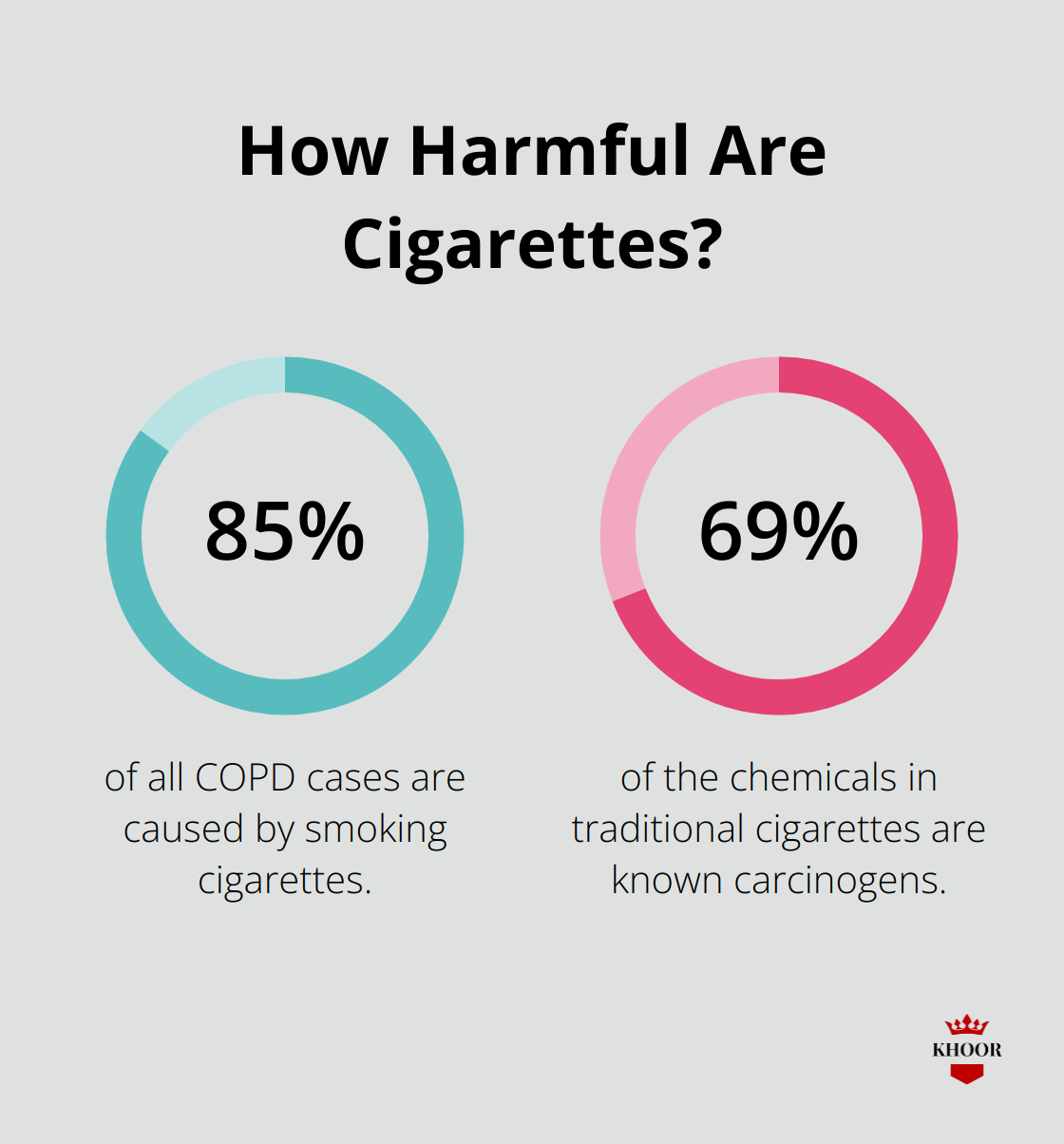
KHOOR herbal cigarettes made with hemp & peppermint leaf might offer a reduced-risk alternative because they do not contain nicotine. Users often turn to hemp for benefits like stress relief and pain management. Nevertheless, the combustion process in both hemp and tobacco can release harmful substances. The potential for carbonyl emissions from burning hemp points to the need for long-term studies to fully assess health implications.
Lung health takes a significant hit from smoking cigarettes. Smokers often experience reduced lung capacity and are prone to lung infections and chronic obstructive pulmonary disease (COPD). Data from the CDC indicates that smoking cigarettes causes about 85% of all COPD cases.
While hemp cigarettes might seem like a safer bet due to the absence of nicotine and lower levels of harmful chemicals, it’s vital to recognize that inhaling any type of smoke isn’t risk-free. The potential for carbonyl exposure still raises concerns about lung health. However, many users report that hemp smoking leads to fewer coughing fits and less phlegm production compared to traditional tobacco smoking.
For a more in-depth comparison of herbal and traditional tobacco options, you may find useful insights in comparing herbal cigarettes to traditional tobacco.
Comprehensive research and individual health considerations are crucial when deciding between hemp and tobacco cigarettes. Understanding these differences allows you to make more informed choices about what you inhale.
YES, the environmental impact of smoking tobacco versus hemp is a significant consideration. It’s clear that sustainability and pollution are pressing concerns for tobacco vs hemp. Hemp requires far less water & no pesticides.
Hemp farming is generally considered more sustainable than tobacco cultivation. Hemp plants require less water, fewer pesticides, and grow quickly in a variety of climates. A study by the European Industrial Hemp Association found that hemp sequesters carbon dioxide at a rate of 15 tons per hectare, making it a carbon-negative crop. In contrast, tobacco farming is notorious for its heavy pesticide use and soil depletion, contributing to environmental degradation.
The manufacturing and disposal of traditional cigarettes are responsible for vast amounts of pollution. According to the World Health Organization, cigarette butts are the most littered item in the world, with about 4.5 trillion butts discarded annually. These contain toxic substances like nicotine and heavy metals, which leach into the soil and water systems. The production process itself emits harmful pollutants, including methane and ammonia.
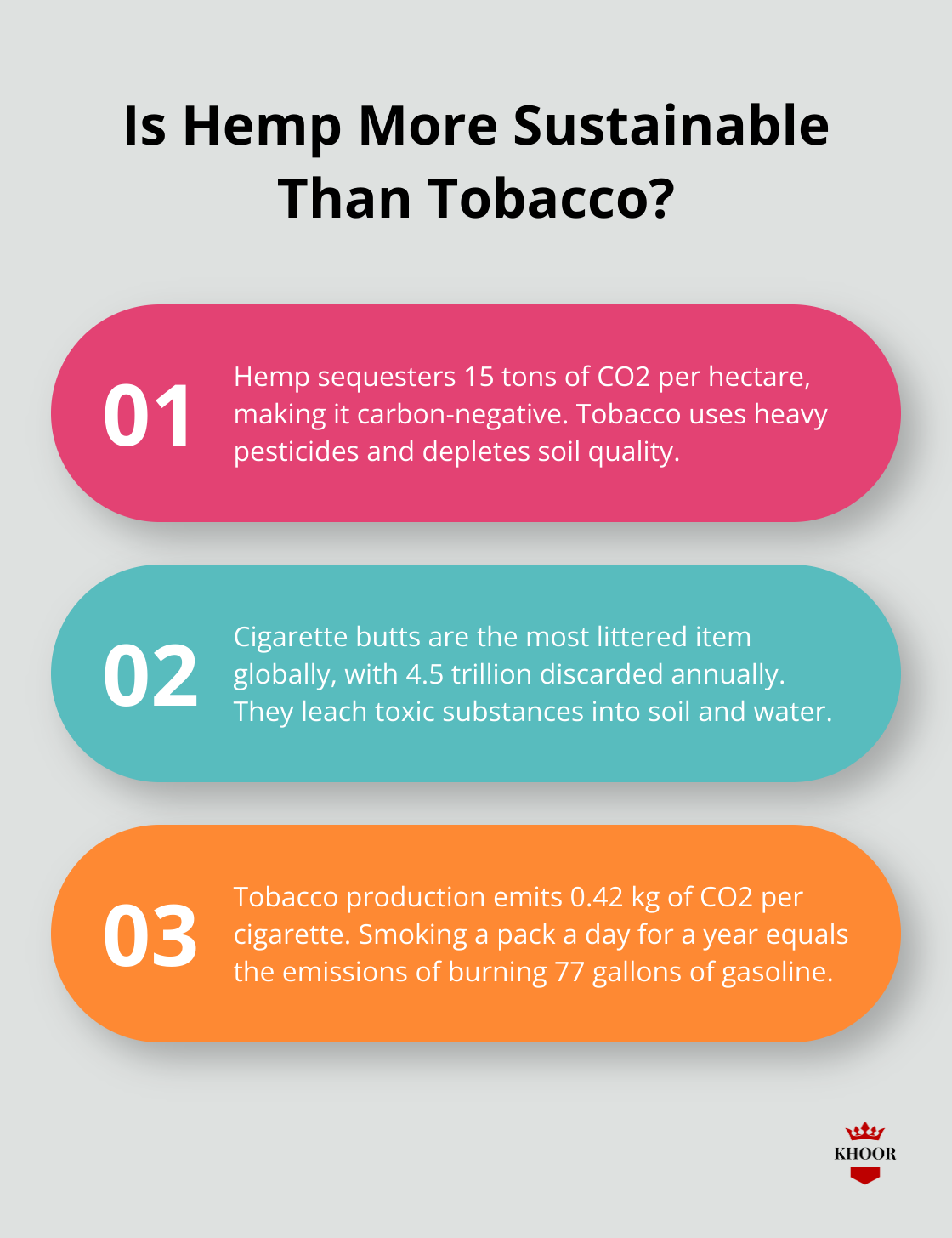
Hemp cigarettes, on the other hand, are often manufactured with fewer synthetic additives. While not completely devoid of environmental impact, the reduced use of chemicals in production and the biodegradable nature of hemp products mean less long-term environmental harm.
The carbon footprint of smoking hemp versus tobacco is another telling factor. A lifecycle analysis conducted by the United Nations Environment Programme revealed that tobacco production emits 0.42 kg of CO2 per cigarette. Consider that smoking a pack a day for a year results in emissions equivalent to burning 77 gallons of gasoline.
Hemp cigarettes offer a potentially lower carbon footprint due to the carbon sequestered by hemp plants during their growth. However, it’s essential to look at each brand’s specific practices, as processing and transportation can offset some of these benefits. For those committed to reducing their carbon footprint, it’s worth investigating companies that prioritize sustainable practices in their hemp production like us.
Understanding the environmental differences between hemp and tobacco cigarettes allows you to make a more informed decision that aligns with both personal health and ecological sustainability.
The legal landscape for hemp and tobacco cigarettes varies significantly.
In the United States, the 2018 Farm Bill marked a turning point by legalizing industrial hemp with less than 0.3% THC. This change opened the door for products like hemp cigarettes, which contain CBD but not nicotine. As of now, nearly all states permit the production and sale of hemp, although some have additional regulations. For instance, Idaho, South Dakota, and Mississippi have stricter laws regarding CBD products.
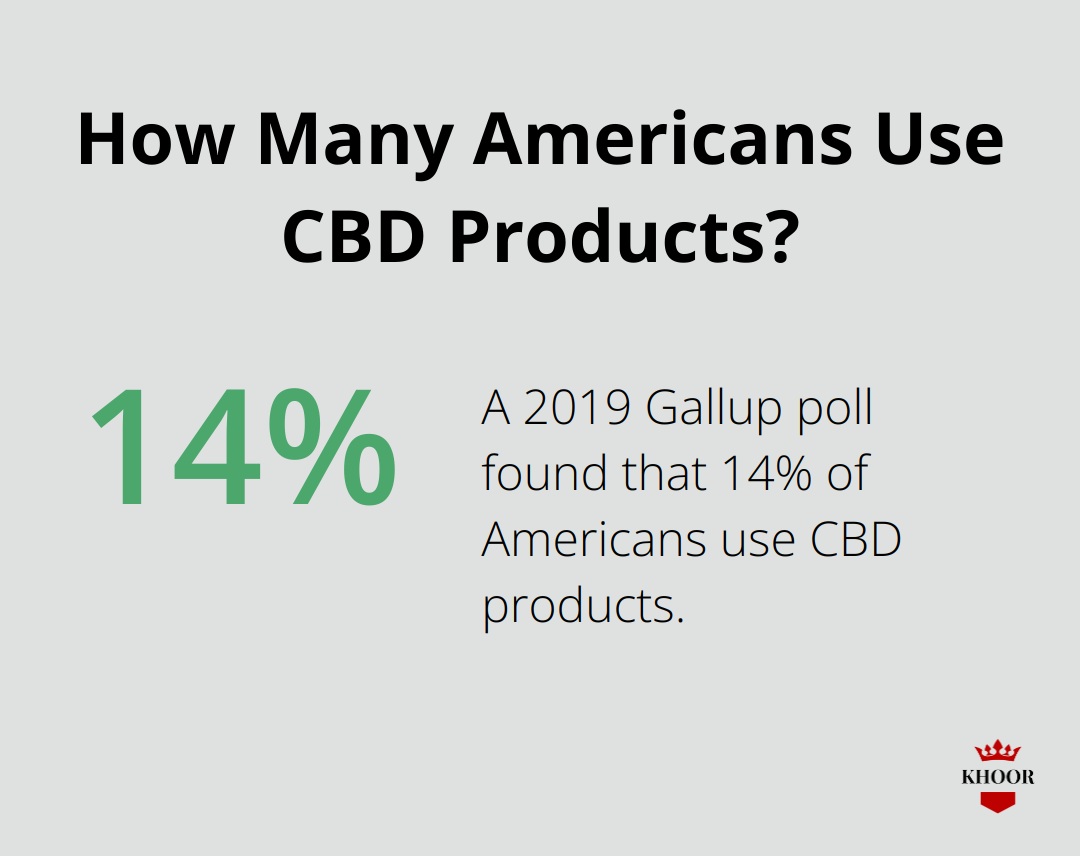
Internationally, the picture is mixed. Countries like Canada and the United Kingdom have legalized hemp, while others have either limited its use or continue to restrict it. Therefore, it’s crucial to research local laws before purchasing or using hemp products.
Tobacco cigarettes face extensive regulations due to their well-documented health risks. The United States has implemented stringent controls, such as the Family Smoking Prevention and Tobacco Control Act of 2009. This act grants the FDA authority to regulate the manufacture, distribution, and marketing of tobacco products.
Globally, tobacco is heavily taxed and regulated, particularly in countries like Australia, where plain packaging laws are enforced to reduce smoking rates. However, despite these regulations, tobacco remains widely available.
Tobacco smoking has seen a decline in social acceptance. Public health campaigns have successfully stigmatized smoking, leading to a significant drop in prevalence. According to the CDC, the percentage of adult smokers in the U.S. fell from 20.9% in 2005 to 13.7% in 2018. Smoking bans in public places have also contributed to this decline.
Hemp, on the other hand, enjoys a growing acceptance due to its association with health benefits. A 2019 Gallup poll found that 14% of Americans use CBD products. Social media and wellness communities often promote hemp as a natural remedy, boosting its popularity. However, some stigma remains due to confusing hemp with marijuana.
The influence of lobbying in the tobacco and hemp industries can’t be ignored. The tobacco industry has a long history of powerful lobbying, spending millions to sway legislation in its favor. For example, in 2018, the industry spent $22 million on federal lobbying in the U.S.
In contrast, the hemp industry is emerging and has less lobbying power. However, the tide is shifting. Companies are increasingly advocating for clearer regulations and greater acceptance of hemp products. Organizations like the U.S. Hemp Roundtable are spearheading efforts to promote hemp legislation.
Understanding these legal and social perspectives can help you navigate the complex landscape of smoking preferences. For more insights on the differences between hemp and tobacco, check out this article.
Understanding the differences between hemp and tobacco cigarettes is key to making informed choices about your smoking habits. Our exploration shows that traditional cigarettes carry significant health risks due to their chemical composition, contributing to serious conditions like lung cancer and heart disease. On the other hand, hemp cigarettes, while lacking nicotine, are not completely risk-free and can emit harmful carbonyl compounds.
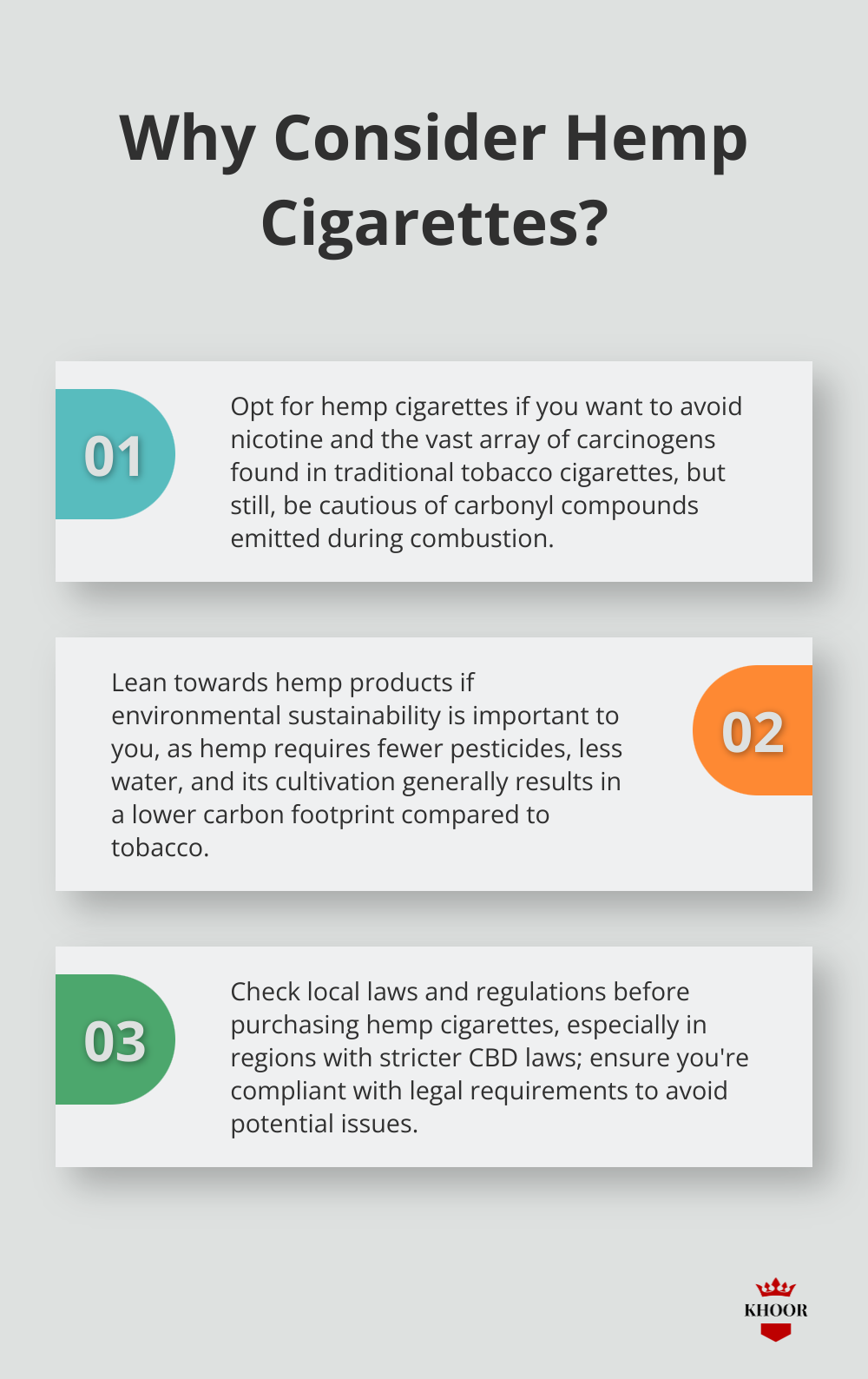
Environmental sustainability is another crucial factor. Hemp farming is generally more eco-friendly, requiring less water and pesticides compared to tobacco. Additionally, hemp’s carbon-negative properties make it a greener choice. Tobacco production, on the other hand, contributes significantly to pollution and environmental degradation, with cigarette butts being a major source of litter.
The legal landscape also tells a different story for hemp and tobacco. Hemp has enjoyed growing acceptance and legalization since the 2018 Farm Bill, while tobacco remains heavily regulated due to its well-documented health risks. Social acceptance of smoking tobacco has declined, thanks to public health campaigns, whereas hemp products are gaining popularity.
Choosing between hemp and tobacco cigarettes ultimately depends on understanding these health, environmental, and legal factors. At KHOOR, we offer a healthier smoking experience with our tobacco-free, nicotine-free herbal cigarettes KHOOR. Available in flavors like Original, Menthol, Vanilla, and Berry Blue, our products provide a rich taste and smooth smoking experience without the harmful effects associated with traditional smoking. Explore our 4-pack flavor sampler or subscribe for discounts and free shipping to make a health-conscious switch. For more insights, check out this article.

Explore the benefits and tips of herbal smoking wellness with information on health impacts, botanical choices, and DIY blends.

Explore how KHOOR supports nicotine replacement with herbal cigarettes, success rates, and user stories for a healthier, smoke-free life.

Explore the benefits of quitting tobacco & nicotine with healthy alternatives. Improve your health and well-being with tips and data-backed advice.

Achieve your quit smoking goals with KHOOR’s supportive approach. Discover benefits, statistics, and practical tips for a healthier life.
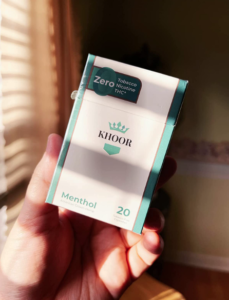
Explore practical tips to smoke without nicotine, including product recommendations and real-life statistics to support your healthier lifestyle choices.

Explore tobacco-free alternatives with KHOOR. Learn about options like herbal cigarettes, nicotine pouches, and vaping for a healthier lifestyle.